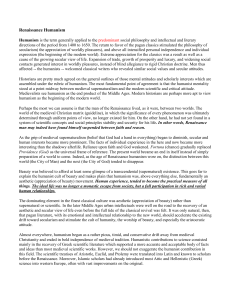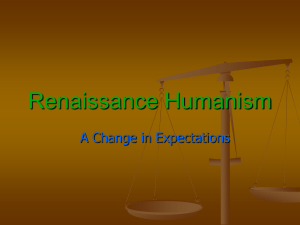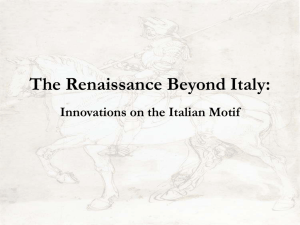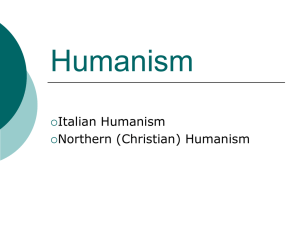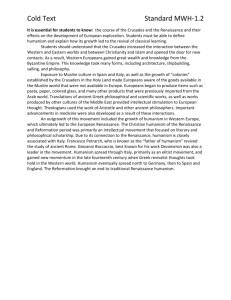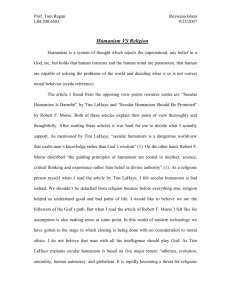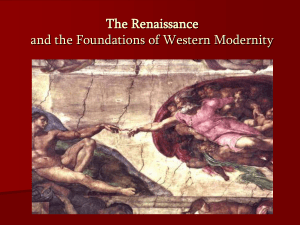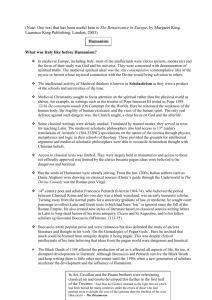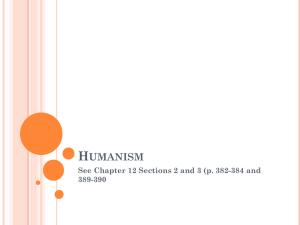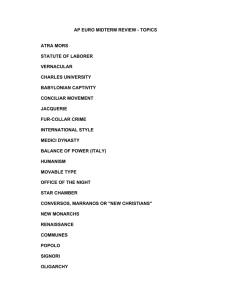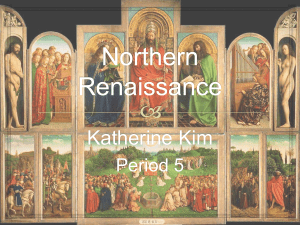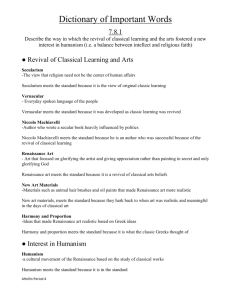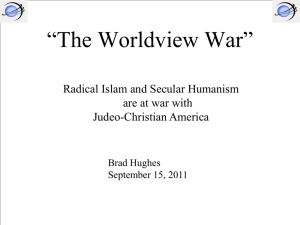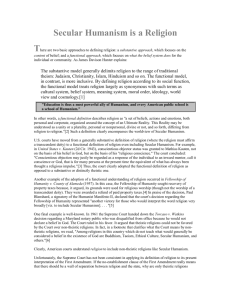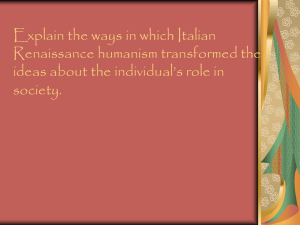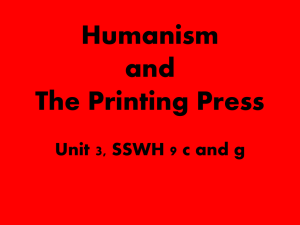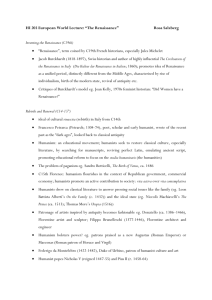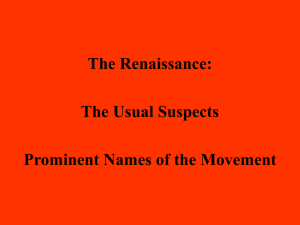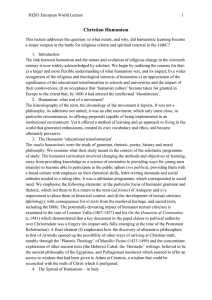renaissance humanism – edited
advertisement
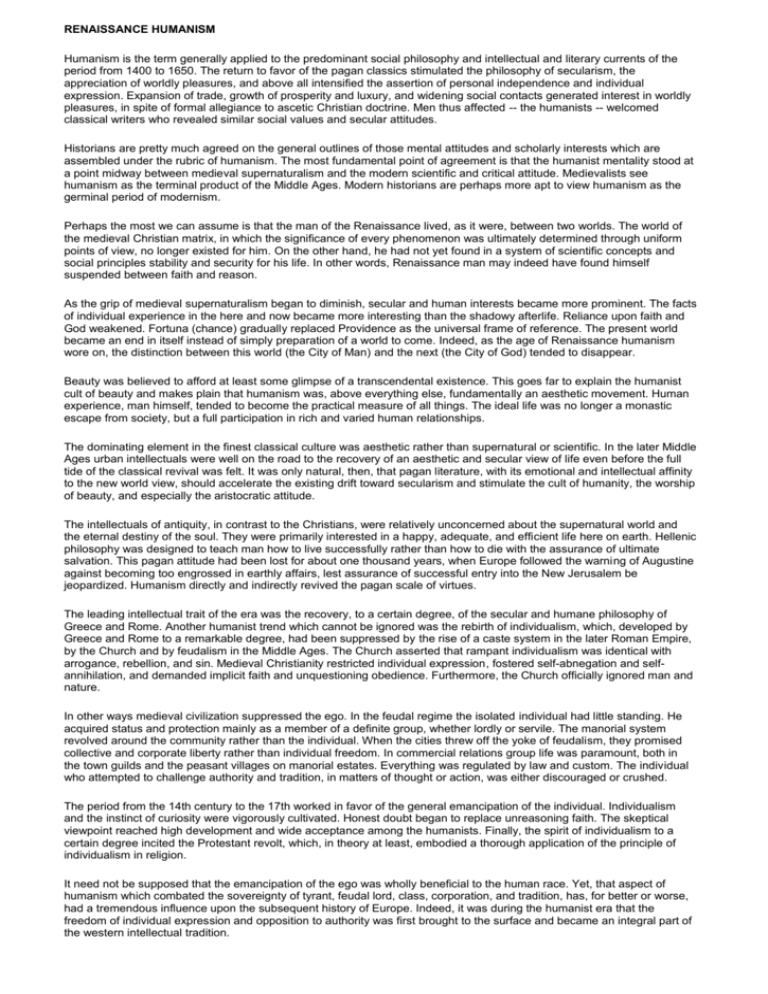
RENAISSANCE HUMANISM Humanism is the term generally applied to the predominant social philosophy and intellectual and literary currents of the period from 1400 to 1650. The return to favor of the pagan classics stimulated the philosophy of secularism, the appreciation of worldly pleasures, and above all intensified the assertion of personal independence and individual expression. Expansion of trade, growth of prosperity and luxury, and widening social contacts generated interest in worldly pleasures, in spite of formal allegiance to ascetic Christian doctrine. Men thus affected -- the humanists -- welcomed classical writers who revealed similar social values and secular attitudes. Historians are pretty much agreed on the general outlines of those mental attitudes and scholarly interests which are assembled under the rubric of humanism. The most fundamental point of agreement is that the humanist mentality stood at a point midway between medieval supernaturalism and the modern scientific and critical attitude. Medievalists see humanism as the terminal product of the Middle Ages. Modern historians are perhaps more apt to view humanism as the germinal period of modernism. Perhaps the most we can assume is that the man of the Renaissance lived, as it were, between two worlds. The world of the medieval Christian matrix, in which the significance of every phenomenon was ultimately determined through uniform points of view, no longer existed for him. On the other hand, he had not yet found in a system of scientific concepts and social principles stability and security for his life. In other words, Renaissance man may indeed have found himself suspended between faith and reason. As the grip of medieval supernaturalism began to diminish, secular and human interests became more prominent. The facts of individual experience in the here and now became more interesting than the shadowy afterlife. Reliance upon faith and God weakened. Fortuna (chance) gradually replaced Providence as the universal frame of reference. The present world became an end in itself instead of simply preparation of a world to come. Indeed, as the age of Renaissance humanism wore on, the distinction between this world (the City of Man) and the next (the City of God) tended to disappear. Beauty was believed to afford at least some glimpse of a transcendental existence. This goes far to explain the humanist cult of beauty and makes plain that humanism was, above everything else, fundamentally an aesthetic movement. Human experience, man himself, tended to become the practical measure of all things. The ideal life was no longer a monastic escape from society, but a full participation in rich and varied human relationships. The dominating element in the finest classical culture was aesthetic rather than supernatural or scientific. In the later Middle Ages urban intellectuals were well on the road to the recovery of an aesthetic and secular view of life even before the full tide of the classical revival was felt. It was only natural, then, that pagan literature, with its emotional and intellectual affinity to the new world view, should accelerate the existing drift toward secularism and stimulate the cult of humanity, the worship of beauty, and especially the aristocratic attitude. The intellectuals of antiquity, in contrast to the Christians, were relatively unconcerned about the supernatural world and the eternal destiny of the soul. They were primarily interested in a happy, adequate, and efficient life here on earth. Hellenic philosophy was designed to teach man how to live successfully rather than how to die with the assurance of ultimate salvation. This pagan attitude had been lost for about one thousand years, when Europe followed the warning of Augustine against becoming too engrossed in earthly affairs, lest assurance of successful entry into the New Jerusalem be jeopardized. Humanism directly and indirectly revived the pagan scale of virtues. The leading intellectual trait of the era was the recovery, to a certain degree, of the secular and humane philosophy of Greece and Rome. Another humanist trend which cannot be ignored was the rebirth of individualism, which, developed by Greece and Rome to a remarkable degree, had been suppressed by the rise of a caste system in the later Roman Empire, by the Church and by feudalism in the Middle Ages. The Church asserted that rampant individualism was identical with arrogance, rebellion, and sin. Medieval Christianity restricted individual expression, fostered self-abnegation and selfannihilation, and demanded implicit faith and unquestioning obedience. Furthermore, the Church officially ignored man and nature. In other ways medieval civilization suppressed the ego. In the feudal regime the isolated individual had little standing. He acquired status and protection mainly as a member of a definite group, whether lordly or servile. The manorial system revolved around the community rather than the individual. When the cities threw off the yoke of feudalism, they promised collective and corporate liberty rather than individual freedom. In commercial relations group life was paramount, both in the town guilds and the peasant villages on manorial estates. Everything was regulated by law and custom. The individual who attempted to challenge authority and tradition, in matters of thought or action, was either discouraged or crushed. The period from the 14th century to the 17th worked in favor of the general emancipation of the individual. Individualism and the instinct of curiosity were vigorously cultivated. Honest doubt began to replace unreasoning faith. The skeptical viewpoint reached high development and wide acceptance among the humanists. Finally, the spirit of individualism to a certain degree incited the Protestant revolt, which, in theory at least, embodied a thorough application of the principle of individualism in religion. It need not be supposed that the emancipation of the ego was wholly beneficial to the human race. Yet, that aspect of humanism which combated the sovereignty of tyrant, feudal lord, class, corporation, and tradition, has, for better or worse, had a tremendous influence upon the subsequent history of Europe. Indeed, it was during the humanist era that the freedom of individual expression and opposition to authority was first brought to the surface and became an integral part of the western intellectual tradition.

